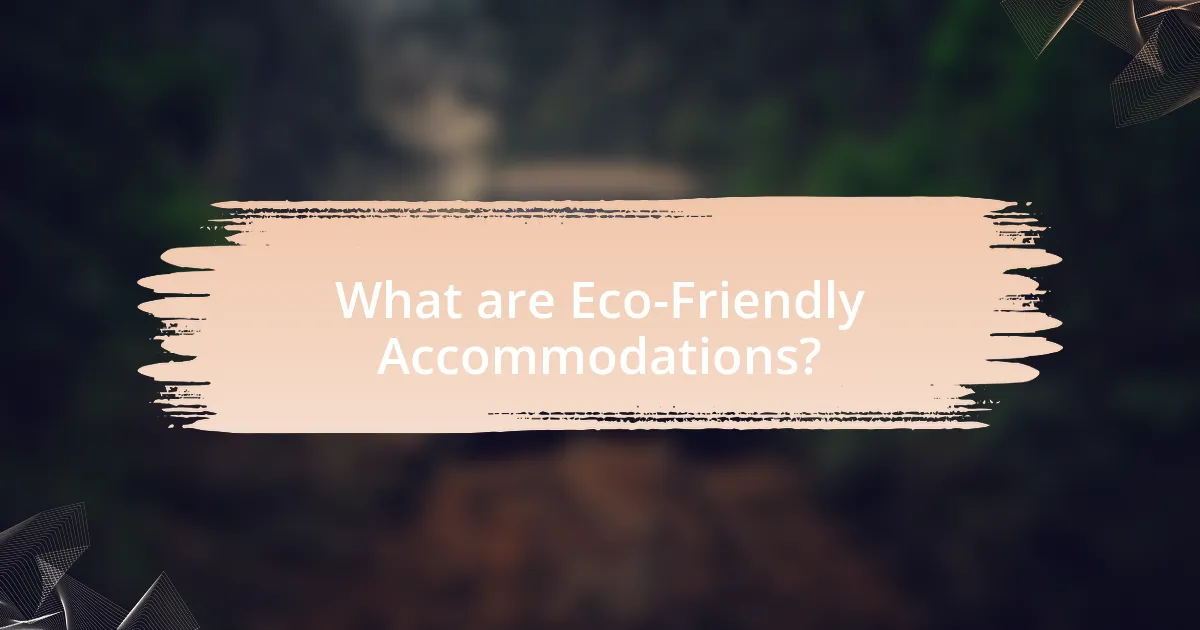Eco-friendly accommodations are lodging options that prioritize sustainability and minimize environmental impact through various practices. This article provides a comprehensive overview of eco-friendly accommodations, detailing their differences from traditional hotels, common sustainable practices, and their contributions to environmental conservation and local communities. It also explores the importance of these accommodations for travelers, the types available, and the certifications that ensure their sustainability standards. Additionally, the article offers guidance on how travelers can choose the right eco-friendly accommodation and support sustainable practices during their stay.

What are Eco-Friendly Accommodations?
Eco-friendly accommodations are lodging options designed to minimize environmental impact through sustainable practices. These establishments often implement energy-efficient systems, utilize renewable resources, and promote waste reduction strategies. For example, many eco-friendly hotels may use solar panels for energy, offer organic food sourced from local farms, and provide recycling programs for guests. According to the Global Sustainable Tourism Council, eco-friendly accommodations contribute to the preservation of natural resources and support local communities, making them a responsible choice for travelers.
How do Eco-Friendly Accommodations differ from traditional hotels?
Eco-friendly accommodations differ from traditional hotels primarily in their commitment to sustainability and environmental responsibility. These accommodations implement practices such as using renewable energy sources, minimizing water usage, and reducing waste through recycling and composting. For instance, a study by the Global Sustainable Tourism Council indicates that eco-friendly hotels often achieve energy savings of 30% or more compared to conventional hotels by utilizing energy-efficient appliances and systems. Additionally, eco-friendly accommodations frequently source local and organic food, supporting local economies and reducing carbon footprints associated with food transportation.
What sustainable practices are commonly implemented in Eco-Friendly Accommodations?
Eco-friendly accommodations commonly implement sustainable practices such as energy efficiency, water conservation, waste reduction, and the use of sustainable materials. Energy efficiency is achieved through the installation of LED lighting, energy-efficient appliances, and smart thermostats, which can reduce energy consumption by up to 30%. Water conservation practices include low-flow fixtures and rainwater harvesting systems, which can significantly decrease water usage. Waste reduction is often addressed through recycling programs and composting, with some accommodations aiming for zero waste. Additionally, the use of sustainable materials, such as reclaimed wood and eco-friendly furnishings, supports environmentally responsible sourcing. These practices collectively contribute to minimizing the ecological footprint of accommodations while promoting sustainability in the hospitality industry.
How do Eco-Friendly Accommodations contribute to environmental conservation?
Eco-friendly accommodations contribute to environmental conservation by implementing sustainable practices that reduce resource consumption and minimize waste. These establishments often utilize renewable energy sources, such as solar or wind power, which significantly lowers their carbon footprint. For instance, a study by the Global Sustainable Tourism Council found that hotels adopting eco-friendly practices can reduce energy consumption by up to 30%. Additionally, eco-friendly accommodations frequently incorporate water-saving technologies, such as low-flow fixtures, which can decrease water usage by 20-50%. By promoting local sourcing of food and materials, these accommodations also support local economies while reducing transportation emissions. Overall, eco-friendly accommodations play a crucial role in fostering sustainable tourism and protecting natural resources.
Why are Eco-Friendly Accommodations important for travelers?
Eco-friendly accommodations are important for travelers because they promote sustainable tourism practices that minimize environmental impact. These accommodations often utilize renewable energy sources, implement water conservation measures, and reduce waste through recycling and composting. According to a study by Booking.com, 70% of global travelers expressed a desire to stay in eco-friendly accommodations, indicating a growing demand for sustainable options. By choosing eco-friendly hotels, travelers contribute to the preservation of natural resources and support local communities, fostering a more responsible travel experience.
What impact do Eco-Friendly Accommodations have on local communities?
Eco-friendly accommodations positively impact local communities by promoting sustainable tourism practices that benefit the environment and local economies. These establishments often prioritize local sourcing of materials and food, which supports local farmers and businesses, thereby enhancing economic resilience. Additionally, eco-friendly accommodations typically implement energy-efficient technologies and waste reduction strategies, which contribute to lower carbon footprints and improved local air and water quality. Research indicates that communities with eco-friendly tourism initiatives experience increased visitor satisfaction and longer stays, leading to higher overall economic benefits. For instance, a study published in the Journal of Sustainable Tourism found that eco-friendly hotels can increase local employment opportunities by up to 20%, demonstrating their significant role in community development.
How can Eco-Friendly Accommodations enhance the travel experience?
Eco-friendly accommodations enhance the travel experience by providing sustainable options that reduce environmental impact while offering unique, immersive experiences. These accommodations often incorporate local culture and natural surroundings, allowing travelers to connect more deeply with their destination. For instance, eco-friendly hotels frequently use renewable energy sources, such as solar power, and implement water conservation practices, which not only lower their carbon footprint but also appeal to environmentally conscious travelers. Research indicates that 87% of travelers prefer to stay in eco-friendly hotels, highlighting the growing demand for sustainable travel options. This preference enhances the overall travel experience by aligning with the values of modern travelers who prioritize sustainability.

What types of Eco-Friendly Accommodations are available?
Eco-friendly accommodations include green hotels, eco-lodges, sustainable hostels, and vacation rentals that prioritize environmental sustainability. Green hotels implement energy-efficient systems, use renewable energy sources, and promote water conservation practices. Eco-lodges are often located in natural settings and focus on minimizing their ecological footprint while providing immersive experiences in nature. Sustainable hostels offer budget-friendly options with eco-conscious practices, such as recycling and using local resources. Vacation rentals can also be eco-friendly when they adhere to sustainable practices, such as using solar energy and promoting local culture. These types of accommodations collectively contribute to reducing environmental impact and promoting sustainable tourism.
What are the different categories of Eco-Friendly Accommodations?
The different categories of eco-friendly accommodations include green hotels, eco-lodges, sustainable resorts, and hostels with eco-certifications. Green hotels implement practices such as energy efficiency, water conservation, and waste reduction, often certified by organizations like LEED or Green Key. Eco-lodges focus on integrating with nature and supporting local communities, typically located in natural settings. Sustainable resorts prioritize environmental stewardship and often feature renewable energy sources and organic food options. Eco-certified hostels provide budget-friendly options while adhering to sustainable practices, making eco-friendly travel accessible to a wider audience.
How do boutique hotels promote sustainability?
Boutique hotels promote sustainability by implementing eco-friendly practices such as using locally sourced materials, reducing energy consumption, and minimizing waste. These hotels often incorporate renewable energy sources, like solar panels, to power their facilities, which significantly lowers their carbon footprint. Additionally, many boutique hotels engage in water conservation efforts, such as installing low-flow fixtures and utilizing rainwater harvesting systems. According to a study by the Global Sustainable Tourism Council, hotels that adopt sustainable practices can reduce operational costs by up to 30%, demonstrating the financial viability of eco-friendly initiatives.
What role do eco-lodges play in conservation efforts?
Eco-lodges play a crucial role in conservation efforts by promoting sustainable tourism practices that protect natural environments and wildlife. These accommodations often implement eco-friendly initiatives such as using renewable energy sources, conserving water, and minimizing waste, which collectively reduce their ecological footprint. For instance, a study by the International Ecotourism Society found that eco-lodges can contribute to local conservation by funding wildlife protection programs and supporting community-based conservation projects. Additionally, eco-lodges often educate guests about local ecosystems and conservation issues, fostering a greater appreciation for nature and encouraging responsible travel behaviors.
What certifications should travelers look for in Eco-Friendly Accommodations?
Travelers should look for certifications such as LEED (Leadership in Energy and Environmental Design), Green Key Eco-Rating, and EarthCheck when selecting eco-friendly accommodations. LEED certification indicates that a property meets strict environmental standards in areas like energy efficiency and sustainable building practices. The Green Key Eco-Rating program assesses hotels based on their environmental practices, awarding keys based on performance. EarthCheck certification focuses on sustainable tourism practices and environmental management, ensuring that accommodations minimize their ecological footprint. These certifications provide assurance that the accommodations adhere to recognized environmental standards.
How do certification programs ensure sustainability standards?
Certification programs ensure sustainability standards by establishing specific criteria that organizations must meet to achieve certification. These criteria often include environmental management practices, resource conservation, waste reduction, and social responsibility measures. For example, the Global Sustainable Tourism Council (GSTC) provides a set of criteria that hotels must adhere to, which includes minimizing energy consumption and promoting local culture. Compliance is verified through regular audits and assessments conducted by accredited third-party organizations, ensuring that certified entities maintain their sustainability commitments over time. This structured approach not only promotes transparency but also encourages continuous improvement in sustainability practices within the hospitality industry.
What are the most recognized eco-certifications in the hospitality industry?
The most recognized eco-certifications in the hospitality industry include Green Key, EarthCheck, and LEED (Leadership in Energy and Environmental Design). Green Key is an international eco-label that evaluates hotels based on their environmental practices, with over 3,000 participating properties worldwide. EarthCheck is a scientific benchmarking certification program that focuses on sustainable tourism, utilized by more than 1,500 organizations globally. LEED is a widely accepted green building certification that assesses the sustainability of building design, construction, and operation, applicable to hotels aiming for energy efficiency and reduced environmental impact. These certifications are essential for hotels seeking to demonstrate their commitment to sustainability and attract eco-conscious travelers.

How can travelers choose the right Eco-Friendly Accommodation?
Travelers can choose the right eco-friendly accommodation by evaluating certifications, assessing sustainability practices, and researching guest reviews. Certifications such as LEED or Green Key indicate adherence to environmental standards, ensuring that the accommodation implements energy-efficient systems and waste reduction strategies. Additionally, travelers should look for properties that utilize renewable energy sources, offer local organic food options, and engage in community conservation efforts. Researching guest reviews can provide insights into the actual sustainability practices in place, helping travelers make informed decisions based on firsthand experiences.
What factors should be considered when selecting an Eco-Friendly Accommodation?
When selecting an eco-friendly accommodation, consider the establishment’s sustainability practices, such as energy efficiency, water conservation, and waste management. These practices often include the use of renewable energy sources, like solar or wind power, and water-saving fixtures, which contribute to a reduced environmental footprint. Additionally, verify if the accommodation has certifications from recognized organizations, such as LEED or Green Key, which validate their commitment to sustainable practices. Researching the sourcing of food and materials used in the accommodation can also provide insight into their environmental impact, as local and organic options typically have a lower carbon footprint.
How can travelers assess the sustainability practices of a hotel?
Travelers can assess the sustainability practices of a hotel by reviewing its certifications, such as LEED or Green Key, which indicate adherence to environmental standards. Additionally, they can examine the hotel’s policies on energy conservation, water usage, waste management, and sourcing of local products. For instance, hotels that implement energy-efficient lighting and water-saving fixtures demonstrate a commitment to sustainability. Furthermore, travelers can read guest reviews and check the hotel’s website for transparency regarding its sustainability initiatives, which often include details on recycling programs and community engagement efforts.
What resources are available for finding Eco-Friendly Accommodations?
Resources for finding eco-friendly accommodations include specialized websites, apps, and certification programs. Websites like EcoBnB and Green Key provide listings of certified green hotels, while apps such as HotelTonight and Booking.com feature filters for eco-friendly options. Certification programs like LEED (Leadership in Energy and Environmental Design) and Green Globe offer recognized standards for sustainability, helping travelers identify accommodations that meet specific environmental criteria. These resources ensure that travelers can easily locate and choose accommodations that prioritize sustainability and eco-friendliness.
What are some tips for supporting Eco-Friendly Accommodations during your stay?
To support eco-friendly accommodations during your stay, choose hotels that have sustainability certifications, such as LEED or Green Key. These certifications indicate that the hotel has met specific environmental standards, including energy efficiency, water conservation, and waste reduction practices. Additionally, opt for accommodations that use renewable energy sources, implement recycling programs, and offer locally sourced food options. Supporting these practices not only reduces your carbon footprint but also encourages more hotels to adopt sustainable practices, contributing to a broader movement towards environmental responsibility in the hospitality industry.
How can guests minimize their environmental impact while traveling?
Guests can minimize their environmental impact while traveling by choosing eco-friendly accommodations, utilizing public transportation, and reducing waste. Eco-friendly hotels often implement sustainable practices such as energy-efficient systems, water conservation measures, and the use of locally sourced materials, which collectively reduce the carbon footprint of their operations. Additionally, using public transportation instead of rental cars decreases greenhouse gas emissions, while minimizing single-use plastics and opting for digital tickets can significantly cut down on waste. According to a study by the Global Sustainable Tourism Council, sustainable tourism practices can reduce energy consumption by up to 30% in accommodations, demonstrating the effectiveness of these strategies.
What actions can travelers take to promote sustainability in hotels?
Travelers can promote sustainability in hotels by choosing eco-friendly accommodations, minimizing resource consumption, and supporting local initiatives. Selecting hotels with green certifications, such as LEED or Green Key, ensures that the establishment adheres to sustainable practices. Additionally, travelers can reduce water and energy usage by reusing towels and turning off lights when not in use. Supporting local businesses for meals and activities fosters community engagement and reduces carbon footprints associated with transportation. According to a study by Booking.com, 72% of travelers are more likely to choose eco-friendly accommodations, highlighting the growing demand for sustainable practices in the hospitality industry.